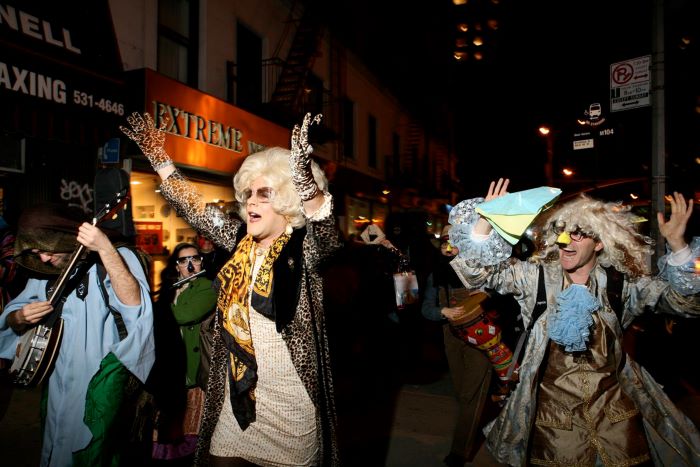Despite the cheeky promotional photos of Amichai Lau-Lavie in a black tank top with smears of dark eye makeup, or in drag with oversized tinted glasses and a bouffant blond wig, we see little of this flamboyant side of him in Sandi DuBowski’s Sabbath Queen. Instead, the film is mostly a serious, soul-searching documentary exploring the continuous burdens and evolving faith of Lau-Lavie. The tone is appropriately weighty for a man carrying such a profound history on his shoulders.
Filmed over 20 years, the documentary captures the tumultuous early 21st century, following Lau-Lavie’s journey through pivotal moments. These include his participation in the Radical Faeries and Occupy Wall Street, the co-founding of Storahtelling—an experimental performance group merging Jewish sacred texts with contemporary flair—and his public pleas for peace during Israel’s attacks on Gaza (notably in 2014 and ongoing).
Born in Israel on Independence Day in 1969 to a distinguished family, Lau-Lavie’s lineage is remarkable. His father was a Holocaust survivor and a prominent diplomat, while his uncle served as Israel’s chief rabbi, part of a rabbinic dynasty stretching back to the 11th century. As an openly queer man, Lau-Lavie identifies as an “other.” His queerness, coupled with the societal and generational changes he has witnessed, such as women protesting for the right to pray at Jerusalem’s Western Wall, leads him to question, challenge, and resist some of the strict traditions within Orthodox Judaism.
His move to New York in the late 1990s unlocked a sense of freedom and exploration. Lau-Lavie joined the Radical Faeries and performed as a drag queen, embodying a defiant challenge to patriarchal forces within Judaism. He also founded Lab/Shul, a progressive pop-up synagogue that honors sacred texts while embracing freedom of expression and moving away from a strict focus on the word “God.” At one service, a middle-aged man tearfully tells Lau-Lavie it’s the first time he feels he has truly prayed.
The documentary includes interviews with Lau-Lavie’s family, such as his mother and his brother Benny, a rabbi, both of whom often disapprove of his sexuality and life choices. Benny’s conservative critiques—particularly regarding Lau-Lavie officiating interfaith and multicultural weddings—can be difficult to hear, though they reflect the deeply ingrained beliefs and expectations passed down through generations.
The film is bookended by a 2017 wedding controversially officiated by Lau-Lavie between two men of different faiths—Judaism and Buddhism. This act is emblematic of his mission to challenge the Orthodox establishment and keep Judaism alive for progressive practitioners. He warns that without such efforts, Judaism risks being overtaken by right-wing orthodoxy. In 2016, he enrolled in rabbinical studies at the Jewish Theological Seminary in New York, an institution that accepts queer students but maintains conservative stances, including opposing interfaith marriages. The exploration of the conflicts he faces—balancing his role at JTS with the backlash from Lab/Shul over his decision to pursue formal rabbinical studies—provides some of the documentary’s most compelling moments.
Sabbath Queen ambitiously tackles a wide array of themes, from historical traumas (including footage of concentration camps) to the fraught politics of organized religion. However, the film maintains a certain distance from Lau-Lavie as a person. We learn little about his personal quirks or romantic relationships, leaving him at times feeling enigmatic despite the deeply personal nature of his struggles. Even so, the film’s layered depiction of his journey conveys the immense pressures he faces.
DuBowski’s documentary is occasionally stirring, leaving viewers with much to reflect upon, particularly the broader implications of faith and tradition in the present day.

















Leave A Comment